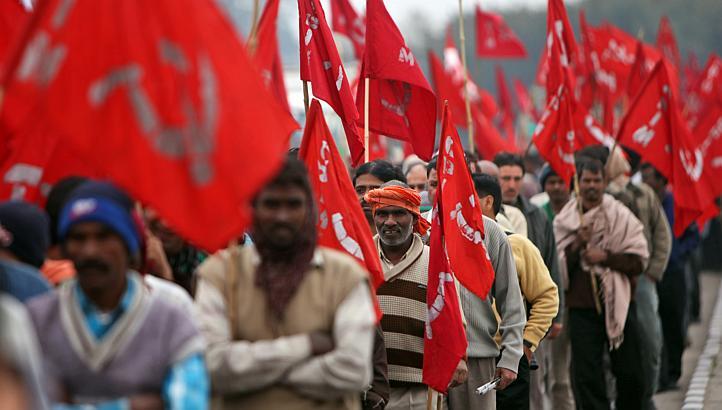#WorkersStrikeBack: In Karnataka, Workers Gear up to Foil ‘Kamdaar’ Modi’s Privatisation Agenda

Representational image. | Image Courtesy: socialism.in
[As lakhs of workers gear up for a historic All India Strike on January 8-9, called for by ten central trade unions, NewsClick brings to you glimpses of the lives of industrial workers in different parts of the country.]
Workers in all industrial sectors, services sector and government employees will go on a two-day strike on January 8-9, 2018, on the call of 10 central trade unions and dozens of independent federations. Except the Rashtriya Swayamsevak Sangh-affiliated Bharatiya Mazdoor Sangh (BMS), the strike call is supported by all central trade unions – Centre of Indian Trade Unions (CITU), All India Central Council of Trade Unions, All India Trade Union Congress, Indian National Trade Union Congress, Hind Mazdoor Sabha, All India United Trade Union Centre, Trade Union Coordination Centre, Self Employed Women’s Association, Labour Progressive Front and United Trade Union Congress. Various farmers and agricultural labour unions have also extended support.
Addressing a massive election public rally at Santemaralli in Chamarajanagar district, Karnataka on May 1, 2018, Prime Minister Narendra Modi had called himself a “kaamdar” (worker). Saying so, he differentiated himself from Rahul Gandhi, who according to him is elite and bourgeois. Ironically, the working class under the current BJP government are the most affected as the policies of this government show that the interest of the government lies in moving away from welfare economy through privatisation. Karnataka, one of the highly industrialised states in the country, has witnessed the privatisation agenda of this government.
Also Read: #WorkersStrikeBack: All Set For Historic 8-9 January Strike in Industries, Rural Areas
For example, Pratibha and Jayaram, members of the Garments and Textile Workers Union (GATWU), had spoken to Newsclick, about struggles of the workers and insufficient wages that plague one of the largest informal sectors in the state of Karnataka; and also about the meddling of the labour laws by the central government. Pratibha had pointed at the attitude of the BJP government at the Centre, which is “anti-labour”. She had said, “The first thing that the central government did, as soon as they came to power was to meddle with the labour laws. We do not know what they are up to and what is it that they want. We all are aware of the protest that the central government had to face when they issued a notification changing the provident funds withdrawal norms. The government had to take back the notification. This government has been doing this throughout. We are worried when this government starts talking about reforms. In the name of reforms, they dilute laws that are the interest of workers.”
Also Read: Who Would the Garment and Textile Industry Workers in Karnataka Vote for?
Pratibha and Jayaram had also spoken about the dilution of the labour laws in the country. “The law says that the wages have to be increased minimum every three years and maximum every five years. But in last 38 years, we have seen only four revisions and according to the law, there should have been eight revisions. We make for 10 lakh votes from the garment industry. It is not only the garment industry, but for textile, printing, dyeing, spinning industries are in the same boat. We have to see what is in the pipeline for this time. None of the governments do anything good for us.”
Also Read: A Struggle for Minimum Wage
Just like the Garments and Textiles workers, the workers in other sectors like transport, public education, panchayat, farmers, health workers in the state have all been adversely affected by the anti-labour laws and policies of the government. For example, the Karnataka State Road Transport Corporation (KSRTC) Staff and Workers Federation went on a 40 days long protest opposing the Centre's “corporate friendly labour policies”, from August 9, 2018. Similarly Anganwadi workers in the state lead a massive protest against the reduction of allocations of the government for Integrated Child Development Services Scheme (ICD).
As Subodh Varma writes for Newsclick, nearly 2.4 lakh workers of government-run public enterprises have lost their jobs since the Narendra Modi led BJP government took power in 2014. That’s a massive 25 per cent of the workforce. Simultaneously, the number of casual and contract workers has increased to 3.8 lakh. The proportion of such employees has zoomed up from just 36% in 2014 to a whopping 53% in 2018. This emerges from the annual Public Enterprises Survey (PES) series, brought out by the Department of Public Enterprises. Seen with the record-breaking disinvestment of public sector assets – amounting to over Rs. 2 lakh crore during the Modi rule – the gutting of what was once India’s pride, the backbone of India’s industrial economy and self-reliance, is clear. This is one of the key reasons why public sector workers are going on a two-day strike on 8-9 January 2018.
Also Read: #WorkersStrikeBack: Under Modi, 25% Decline in Public Sector Workers
All the left parties and the affiliated unions in Karnataka will be gathering outside town hall at 10:30 am on January 6, 2018, in Bengaluru. Newsclick will bring you in detail reporting and stories of workers of various public sectors in Karnataka.
Get the latest reports & analysis with people's perspective on Protests, movements & deep analytical videos, discussions of the current affairs in your Telegram app. Subscribe to NewsClick's Telegram channel & get Real-Time updates on stories, as they get published on our website.
























